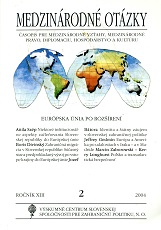Identita a štátny záujem v slovenskej zahraničnej politike
Identity and State Interests in the Foreign Policy of Slovakia
Author(s): Jozef BátoraSubject(s): Politics / Political Sciences
Published by: Research Center of the Slovak Foreign Policy Association (RC SFPA)
Summary/Abstract: The article invokes a set of social constructivist approaches to the study of world politics and conceptualises Slovak foreign policy in the light of identity formation. Central to the argument is the notion that actions of states cannot be derived exclusively from state interests (as realists in the IR theory would have it) but that identities of states precede interests. As Wendt (1998:231) argues, “[i]nterests presuppose identities because an actor cannot know what it wants until it knows who it is… [Yet] identities by themselves do not explain action, since being is not the same thing as wanting… Without interests identities have no motivational force, without identities interests have no direction.” It is therefore crucial for a state (or any other actor) to have an identity so as to be able to act in a meaningful way. Establishing an identity is dependent upon an actors’ self-understanding and on the recognition of this self-understanding as valid by other actors with whom s/he interacts. Identity therefore is reflexive. The ability to bestow a certainidentity upon us rests with those actors who already are what we are striving to become. Ringmar (1996:81) calls these audiences the circles of recognition.
Journal: International Issues & Slovak Foreign Policy Affairs
- Issue Year: XIII/2004
- Issue No: 02
- Page Range: 39-54
- Page Count: 16
- Language: Slovak

